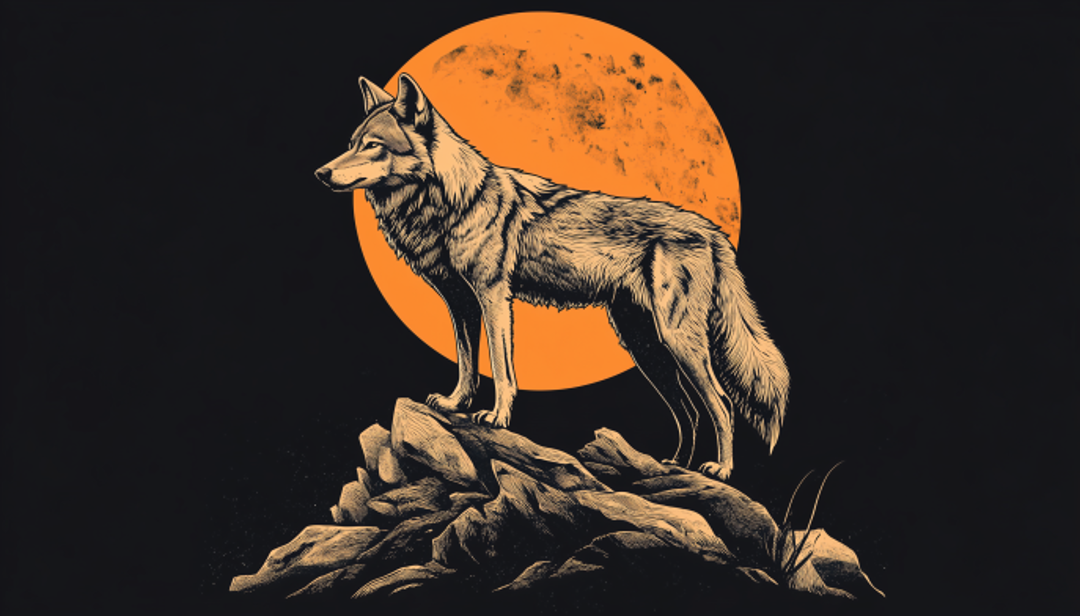Are You a Lone Wolf Hiding in Introvert Clothing? Signs You’re More Than Just Introverted
Lone wolves are often mistaken for introverts, but if you feel different, there’s a reason. While introverts recharge in solitude, lone wolves choose it as a way of life. Explore the traits that set lone wolves apart, why they thrive on independence, and how their path diverges from the typical introvert experience.


Back
8 mins read
Do you thrive when you're on your own, charting your path without worrying about what others think?
If so, you might have a lone wolf personality. We're not talking about actual wolves (though the metaphor stems from there) – this is about individuals who naturally prefer independence and self-reliance, often feeling different from typical introverts as they choose to walk alone in life, both personally and professionally.
Being a lone wolf isn’t just about enjoying time alone. It’s a mindset — valuing autonomy and trusting your instincts over following the crowd. But not everyone who enjoys solitude fits the lone wolf mold.
So, how can you tell if you’re truly living the lone wolf lifestyle or if you’re simply an introvert who needs time to recharge? Let’s dive in and find out.
Lone Wolf Personality: More Than Just Being a Loner

Now, you might be thinking, “Isn’t a lone wolf just another word for a loner?” Not quite. A loner may feel content being alone, but a lone wolf chooses solitude as a way of life. While their traits can overlap, the lone wolf personality runs deeper and reflects a conscious decision to walk their own path. Let me break it down for you.
A lone wolf chooses independence not because of discomfort with others but because they genuinely prefer their own company and way of doing things. It’s not about avoiding people – it’s about valuing autonomy above all else.
This mentality often overlaps with traits seen in personality frameworks like the Enneagram Type 5 — individuals who cherish their independence, protect their energy, and feel most comfortable relying on themselves. While not every lone wolf aligns with this type, the shared preference for solitude and self-sufficiency highlights why lone wolves stand apart from typical introverts.
Lone wolves typically have a strong sense of self and a clear personal vision. They aren’t swayed by societal norms or peer pressure. Instead, they march unapologetically to the beat of their own drum.
Some key characteristics of the lone wolf personality include:
- Independence
- Self-reliance
- Strong sense of self
- Clear personal vision
- Unconventional thinking
- Individualistic pursuits
- Introversion
- Emotional reservation
How Is the Lone Wolf Personality Type Different from Being Introverted?

Many people confuse being a lone wolf with being an introvert, but they aren’t the same thing. While both value solitude, their reasons and approaches differ significantly.
Introversion is a personality trait rooted in the need to recharge after social interactions, while the lone wolf mentality reflects a natural inclination toward independence and self-reliance. For introverts, solitude is often a preference to regain energy, whereas lone wolves choose to walk their own path, seeing solitude as part of their identity.
At first glance, introverts and lone wolves may seem alike, but their motivations and behaviors reflect distinct tendencies. The table below highlights the most notable differences between the two.
Lone Wolves vs Introverts: Spotting the Differences
| Trait | Introverts | Lone Wolves |
|---|---|---|
| Social Energy | Need solitude to recharge after socializing. | Choose solitude, but socializing doesn’t drain them. |
| Independence | Can work independently but collaborate when needed. | Prefer working alone, driven by self-reliance and autonomy. |
| Social Connections | Nurture a small circle of close friends. | Prefer their own pack or often have no pack at all. |
| Decision Making | Seek input but process decisions internally. | Trust their judgment and rarely consult others. |
| Group Comfort | Can enjoy small gatherings with trusted people. | Avoid groups, rarely feeling like social animals. |
While this table outlines the key traits, the differences between introverts and lone wolves run deeper.
Introverts typically enjoy solitary activities but still seek solace in the company of their small circle of trusted friends. They appreciate meaningful relationships and slowly expand their connections over time. Lone wolves, however, prioritize independence, often remaining in their own pack or choosing to walk alone, valuing autonomy over connection.
For introverts, solitude acts as a temporary retreat—necessary to recharge but not permanent. Lone wolves, by contrast, view solitude as their default state, finding solace in their own company.
It’s important to recognize that personality exists on a spectrum.
You can be an introvert with lone wolf tendencies or a lone wolf who occasionally seeks connection. Understanding these distinctions helps in navigating personal growth, relationships, and professional environments in a way that honors your nature.
9 Signs Are a Lone Wolf Not Just an Introvert

Now that we’ve explored the differences between introverts and lone wolves, let’s dive into the tell-tale signs that may indicate you possess a lone wolf personality.
1. You value your independence above all else.
Your autonomy isn’t just important; it’s essential. You thrive when you're calling the shots, and nothing feels more natural than forging your own path. We can't blame you for wanting to be your own boss—independence is the cornerstone of the lone wolf personality.
Lone wolves take pride in being self-sufficient and have a heightened sense of self-awareness. They rarely seek validation or approval from the external world, relying instead on their internal compass.
2. You're thrive in in solitude.
While others might get restless after a few hours of solitude, you can spend days or weeks content in your own company. Spending time alone isn’t something you endure—it’s something you savor.
For lone wolves, solitude is an opportunity for self-improvement and maintaining mental and emotional well-being without external distractions. You recharge best in quiet environments and don’t feel the need to fill your schedule with social engagements.
3. Others’ opinions do not easily influence you.
Peer pressure? That’s for the pack, not for you. Lone wolves trust their judgment implicitly, and their decisions rarely waver based on outside input.
You don’t chase trends or bend to societal norms; instead, you carve your own path, staying true to your personal vision. The external world’s expectations hold little sway over your choices.
4. You prefer to solve problems independently.
Lone wolves are naturally self-reliant and excel at problem-solving. When challenges arise, your instinct is to handle them alone, relying on your skills and resourcefulness.
While this is often a strength, it’s important to recognize that seeking help isn’t a weakness. Collaboration can sometimes bring fresh insights without compromising your independence.
5. You're often labeled as "mysterious" or "hard to read".
Lone wolves tend to keep their thoughts and emotions under wraps, which can make them appear mysterious to others. You’re not intentionally secretive—you're simply selective about what you share and with whom.
Despite their quiet nature, lone wolves are often great listeners and sharp observers, using what they learn to navigate the external world more effectively.
6. You have unconventional views or lifestyle choices.
Where others might see limits, you see possibilities. Lone wolves think outside the box and aren’t afraid to break away from the norm if it aligns with their values.
This independent streak drives them to create unique lifestyles or pursue unconventional goals, regardless of external judgment.
7. You're self-motivated and driven.
Lone wolves draw their motivation from within. Your drive doesn’t stem from competition or external recognition but from personal ambition and a desire to achieve goals on your own terms.
This internal focus and mental toughness allows lone wolves to remain steady and determined, even without outside encouragement.
8. You have a rich inner world.
Everyone has an inner world, but for lone wolves, it’s particularly vivid and expansive. Spending time immersed in your thoughts feels natural, and you often lose yourself in creativity, philosophy, or personal projects.
This inner world can be a source of inspiration, though it sometimes creates a barrier that leaves others feeling distanced or unable to fully relate to you.
9. You're self-reflective and introspective.
Lone wolves are naturally introspective. You regularly analyze your thoughts, actions, and beliefs, refining your sense of self through deep reflection. This habit of self-examination helps you stay aligned with your personal values and make adjustments where needed.
The Lone Wolf Lifestyle: Strengths and Struggles

Being a lone wolf isn’t just about brooding in solitude (though that can have its appeal). This personality type comes with unique advantages that many thrive on—but it’s not without its difficulties.
Here are some of the strengths of being a lone wolf:
- Self-reliance: You're incredibly resourceful and can handle whatever life throws at you. Your ability to trust yourself makes you resilient, adaptable, and capable of standing strong even when faced with uncertainty.
- Leadership by Example: Lone wolves often make strong leaders, not by dominating others but by leading through action and quiet confidence. Your self-sufficiency and decisiveness inspire those around you, and your focus on personal integrity makes you someone that others respect. People are drawn to leaders who don’t seek approval but who forge their own path.
- Creativity: Without the noise of others' opinions, your unique ideas can flourish. Time alone allows you to think deeply, dream freely, and innovate without distractions.
- Authenticity: You stay true to yourself, no matter what. This sense of authenticity creates strong personal values and helps you live in alignment with your beliefs.
- Efficiency: Working solo often means getting things done faster, your way. You’re not bogged down by endless discussions or group consensus, allowing you to focus entirely on your goals.
- Deep focus: You can dive fully into your passions without social distractions. This intense focus allows you to master skills, complete projects, and develop expertise that might take others far longer to achieve.
While these strengths can be powerful assets, they often come with their own set of challenges. Here are some struggles that people with the lone wolf mentality may face:
- Loneliness: Extended solitude can lead to isolation, especially during hard times. Even if you prefer to be alone, it’s natural to crave connection during moments of vulnerability. Without a support system, the weight of challenges can feel heavier.
- Strained Relationships: Keeping emotional distance can lead to one-sided relationships, where others feel more invested or connected than you do. While independence is a strength, it can create barriers to deeper emotional connections. Letting others in doesn’t diminish your autonomy—it strengthens your bonds.
- Missed Opportunities: Sometimes collaboration sparks ideas you wouldn’t reach alone. Your desire to handle everything solo may limit your exposure to new ideas or valuable partnerships.
- Limited Perspective: Other viewpoints can help you grow and see things differently. While self-reliance is valuable, outside perspectives can introduce solutions you might not have considered.
- Perceived as Aloof: Independence might come across as coldness or arrogance to others, making deeper social integration harder.
- Burnout: Handling everything solo can be mentally and physically draining. Without delegation or support, it’s easy to overextend yourself, leading to exhaustion.
- Perfectionism: With no one to balance you out, the drive to excel can become overwhelming. The pressure to get everything “just right” may limit progress or cause frustration.
Finding Balance: How to Thrive as a Lone Wolf

Recognizing yourself in the lone wolf description can be empowering, but even the most self-reliant individuals benefit from balance. Harnessing the strengths of your lone-wolf nature doesn’t mean giving up independence—it means refining it.
Here are some strategies to help you thrive while avoiding the common pitfalls of isolation:
- Cultivate selective relationships: Focus on quality over quantity. Build close relationships with a few like-minded individuals who understand and respect your need for alone time. These connections offer support without infringing on your independence.
- Refine your social skills: Even lone wolves benefit from strong communication skills. Think of social interaction as a tool—one you might not use often, but that sharpens your ability to navigate the external world when necessary. Practicing these skills ensures you can engage effectively without feeling drained.
- Embrace collaboration on your terms: Seek out projects where your unique perspective adds value but still allows autonomy. Choose environments that honor your individuality while offering room for teamwork when it aligns with your goals.
- Communicate boundaries clearly: Your need for solitude isn’t a rejection of others. Let people know your alone time is essential for recharging, not a sign of disinterest. A little clarity can prevent strained relationships and help others appreciate your lone wolf tendencies.
- Push your own limits (in small steps): Growth often lies just outside your comfort zone. Try engaging in new social activities or reaching out for advice when it feels right. Pushing these boundaries selectively can lead to unexpected personal growth without compromising your core nature.
Embrace Your Lone Wolf Nature in a Pack World!

Whether you're a full-fledged lone wolf, an introvert with lone wolf tendencies, or somewhere in between, understanding and accepting your nature is key. In a world that often celebrates collaboration and constant connection, it’s easy to overlook the quiet power of independence.
But make no mistake—there’s strength in standing apart.
Being a lone wolf doesn’t mean rejecting connection altogether. It reflects a strong sense of self, a desire to lead your own path, and the ability to thrive on your own terms. This isn’t a flaw—it’s a unique strength that, when embraced, can become a personal superpower.
So, to all the lone wolves out there: howl proudly.
Your self-reliant nature and individual perspective are valuable in ways the world may not always recognize immediately. But remember, even the most independent wolves benefit from stepping out of the shadows now and then.
The world needs your voice—sometimes as a quiet observer, sometimes as a bold leader.


Return to Blog





